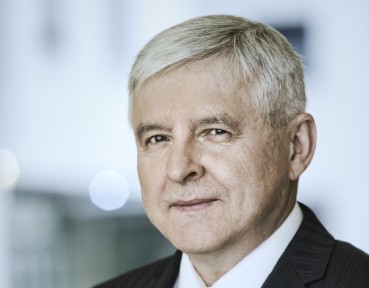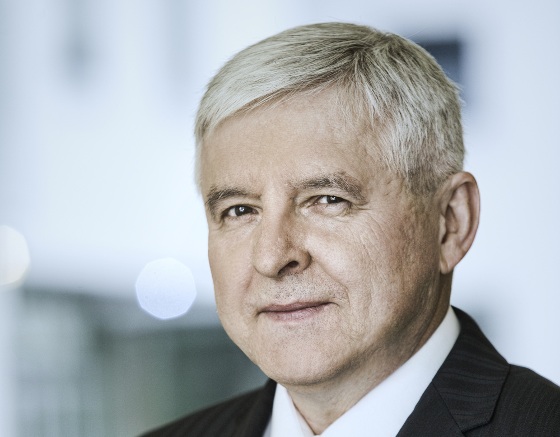Tydzień w gospodarce
Category: Trendy gospodarcze

Jiří Rusnok, Governor, Czech National Bank (Fot. Czech National Bank)
For weeks now, the citizens of Ukraine have been defending their country. For weeks now, complicated political negotiations on escalating economic sanctions against Russia have been under way. For weeks now, Central and Eastern European countries in particular have been offering asylum to Ukrainian citizens fleeing the war. We now know that Europe will never be the same again.
At this moment, it is impossible to grasp the extent of the damage to human lives and thwarted fates and hopes of the Ukrainian people. It is still impossible to quantify the losses the European economy will suffer due to the ruthless actions of Russian troops decimating Ukrainian territory. We can still only estimate from TV footage how much aid will be needed to rebuild the Ukrainian economy. However, my fear is that when the war is over, the reality will be even worse than our most pessimistic scenarios. This is because the aggressor is not only choosing military targets, but is also cold-bloodedly targeting civilian ones, including infrastructure and some of the pillars of the Ukrainian economy.
Now that we can see how trade links with Ukraine have been disrupted and the effect this is having on Czech businesses, we realise the importance of this country for Europe’s automotive industry and the food industry worldwide.
Is it possible to start quantifying the impacts of this conflict on the Czech economy a few weeks after Russia’s invasion of Ukraine? Not quite. This non-economic shock is the second “black swan” event to hit the economy, coming hot on the heels of Covid and bringing with it a high degree of uncertainty and risk. However, it is now clear that the Czech National Bank’s winter forecast from the start of February has been completely overwritten by this conflict.
The war that broke out on 24 February 2022 is yet to be reflected fully in all the macroeconomic variables for the Czech Republic. However, we can already estimate that this type of shock is and will be of a stagflationary nature. This means it will foster higher inflation while adversely affecting economic activity.
The mission of the Czech National Bank in the second half of last year was clear – to tame the domestic component of inflation in an economy that had returned to growth after Covid. With the benefit of hindsight, this mission was relatively easy – to identify domestic inflation pressures, avoid being swayed by arguments that inflation is imported and therefore temporary, and start raising interest rates. The aim was to cool domestic demand, fuelled by wage growth in a tight labour market and forced savings from the lockdown. We identified this relatively early and responded accordingly.
If there had been no war in Ukraine, our forecast for this year expected economic activity to grow by around 3%. At the same time, we assumed that inflation could peak at around 10% roughly in the middle of this year and then start decreasing towards the 2% inflation target, to which we could respond by lowering rates in the second half of this year. However, the war has changed all that.
I think it is still too early to assess the economic impacts of the war, as we do not know how long it will last. In any case, it will affect the supply side – the war will only intensify supply-side shocks that affect inflation. Economic activity will also be adversely affected, with the war in Ukraine cooling the economy. The war will not only affect trade links with Ukraine and Russia, but it will also have a significant effect on the sentiment of households and firms, which– in combination with higher costs – will reduce their consumption and investment activity.
The question is how this cooling of economic activity will feed through to the price level, or in other words how much it will contribute to inflation in the future. According to our preliminary assumptions – and in this respect we will wait for our new macroeconomic forecast to be published in May – inflation can be expected to rise to higher levels and stay high for longer than indicated in the previous forecast. At the same time, the new forecast will be subject to even greater uncertainty than the previous one, not least because it is impossible to estimate how long the conflict in Ukraine will last.
The Czech Republic has been living with high inflation for over six months now and this will probably continue for several more months. However, the CNB is actively dampening future inflation by raising interest rates. It can be assumed that inflation will peak around the middle of this year and record a turnaround after that, aided by the monetary policy steps taken so far. This fundamental narrative of the forecast will likely remain unchanged from the original scenario. The difference will be that inflation will rise higher than the CNB expected only recently because of the war in Ukraine, and will decline more gradually. The first interest rate decrease will probably also be postponed for this reason.
The steps outlined above are the macroeconomic response of the Czech National Bank to the impacts of the war between Russia and Ukraine. They ensue from our statutory mandate to maintain price stability. It is also important not to forget the human dimension of this unnecessary conflict. In the very first days of the war, the Czech Republic accepted and provided protection to around 300,000 Ukrainian refugees, mostly women and children, representing about 3% of the Czech Republic’s total population. We thus rank second after Poland in terms of the number of refugees accepted per capita.
The Czech National Bank’s employees are also trying to help in various ways. Some have provided accommodation to Ukrainian citizens, others have helped financially, among other things by contributing to a collection organised by the CNB for humanitarian organisations operating in Ukraine. Providing Ukrainian refugees with a roof over their heads in CNB accommodation facilities in three Czech cities was a small gesture of help from the point of view of our institution, but fundamental to those fleeing the war.
Besides immediate humanitarian aid to the war-torn country and its citizens, we should also start preparing ourselves mentally for better times to come, i.e. for when it is time to rebuild Ukraine and material aid from neighbouring countries is needed. We must hope that this European country will regain the economic strength and importance it had before the war and that no one will ever challenge its sovereignty again.
Jiří Rusnok, Governor, Czech National Bank.
The article is published in a series of articles in Obserwator Finansowy written by governors of central banks and distinguished economists. The series is under the special patronage of the Governor of Narodowy Bank Polski, Professor Adam Glapiński. The authors of the articles have agreed to waive their fees for writing the texts, and in exchange NBP shall donate the amount equivalent to the fees onto the account of the National Bank of Ukraine in order to support the NBU during the war. Below is a foreword by the Governor of NBP to the whole series:
On 24 February a huge tragedy occurred, in the face of which it is impossible to simply move on as if nothing had happened.
Nobody can remain indifferent to the misfortune that has befallen the Ukrainian nation.
All of us are shocked by the press reports, and particularly by what we see in the mass media.
Fighting Ukraine is not only its brave soldiers, but also an army of thousands of civilians trying to preserve normality in a country stricken by Russian aggression.
This army includes the staff of the National Bank of Ukraine, with whom NBP is in constant contact.
Aware of our Ukrainian colleagues’ needs, we have invited several central bank governors and eminent economists to share their knowledge on the economic processes taking place around the world.
It is rare for such a distinguished group of authors to feature in Obserwator Finansowy, which is published by NBP. It is also worth underlining that all the authors have waived the fees for their articles in order to donate them to meet the needs of our colleagues working in the National Bank of Ukraine.
I believe that you will find the series of these articles interesting, especially since they not only share the knowledge and experience of their authors, but also express goodwill towards the war-afflicted NBU.
Prof. Adam Glapiński, Governor of NBP


